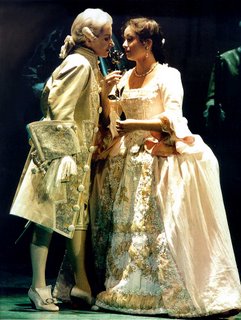what a day

for an auto de fey. Kidding. :)
I just got back from Chicago where I went to see Der Rosenkavalier. We left at 10 this morning and I got back at 10 tonight. Fun and games. Actually, it was so unbelievably worth it, I can't even explain it. I now have a new favorite opera. I heard it would get tiring and long and that I'd fall asleep but I was on the edge of my seat the whole time. I "studied" it in college but I think it was toward the end of the semester and I was getting lazy. The only CD we had was in German and Japanese and my German is sehr schlecht. And I didn't feel like dealing with the LP at the time. I don't think we discussed it much though so I didn't learn nearly as much about it as I did about Tristan, Lohengrin, or any of a number of Handel's operas. Hmm.
I am especially glad I got to see Susan Graham as Octavian. In case any of you fair readers need a quick background, here goes:
In the early days of opera, many of the big male roles went to men called "castrati." They had been castrated at a young age to preserve their soprano voices. Successful castrati led quite colorful and rich lives. Many castrati, however, were needlessly castrated. :( For an amusing rendition of this history that is not accurate, you might want to watch Farinelli, a movie about Handel's favorite castrato. Supposedly they melded together the voices of a female soprano and a male countertenor (male alto) to achieve the castrato sound. The last castrato was recorded at the Vatican in 1927 and he sounded AWFUL, most likely because he was old and his vocal chords were too wobbly.
But I digressify (to quote GWB on whitehouse.org). I need to look into the exact reasons why Richard Strauss, a composer who died in the twentieth century, decided to make his male lead a female "pants role" as he obviously did not have to deal with the castrati thing. I imagine he wished to compose several duets and trios for all-female voices and that he may have considered it to be in a great tradition. Cherubino in Le Nozze di Figaro of course is a female pants role (one which requires the woman in it to cross-cross-dress), and Nero in L'incoronazione di Poppea is a soprano role. So the story in Der Rosenkavalier is that of Octavian, a young nobleman (seventeen, actually) who is involved with the Marschallin, who is a married noblewoman, essentially a princess. She breaks up with Octavian because she knows that he will have to leave her eventually. He is then required to present a silver rose to his buffoonish cousin's fiancee, and he falls in love with said fiancee and so the rest of the opera involves his getting her out of her engagement and the Marshallin's finally letting him go. It's a very "655 male female relationships, sub-field V drama" (in meta-library-MARC speak) sort of situation, and I think it resonates strongly with females in particular. Because it's about aging and wisdom and grace and tact. It would make me cry if I wasn't too proud. Plus the music is the best I've ever heard. I had to grow into it though. I listened to Strauss's Vier Letzte Lieder just after I graduated from college and I can barely deal with them. They're too painfully gorgeous. I mentioned this to a friend of mine and she said she first heard them *in the car* on NPR and had to pull over.
Oh, and no, Susan didn't kiss Ofelia. Incidentally, the chick in the dress in the pic is the soprano who played Sophie today.
(Heh, heh: 655 Girl on girl action $v drama)


0 Comments:
Post a Comment
<< Home